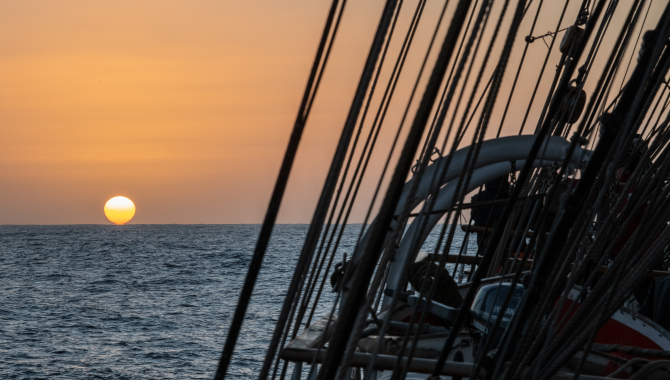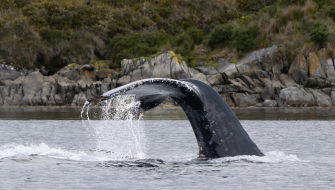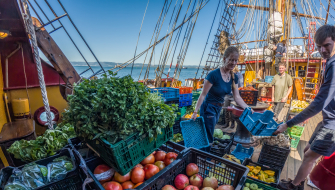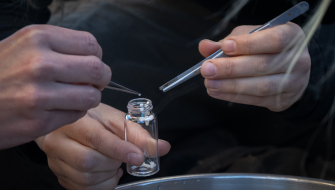Climate strategy
Sustainability and research

As an organization, we strive to reduce our impact on the environment and actively contribute to a sustainable future. In order to achieve these objectives, we have put a number of concrete measures and initiatives on paper that we have already initiated in recent years and will further develop in the coming years.
1. Research into new fuels in the Antarctic gateways
Our engines are ready to use biofuel, but the biggest hurdle besides the high prices are the availability of these fuels in the local Southern ports. Our director is, as part of the Antarctic Gateway Committee, actively involved in the research for new fuel options in Ushuaia and the other gateways. This initiative is aimed at reducing our dependence on traditional fuels and promoting more environmentally friendly alternatives for all operators sailing to Antarctica.
2. Pushing for recycling options in local ports
Together with the other IAATO operators and in collaboration with local agents and local governments, there has been recently a breakthrough in the recycling options in Ushuaia. Despite the fact that we separate all our waste and reuse it where possible, it often ended up on land in a big pile. This initiative contributes to promoting a circular economy in local ports.

3. Lowering average speed
By lowering our average speed, the engine is used in the most favourable way, reducing the ship's emissions. Keeping enough time in our planning for our voyages also offers the most opportunity to sail as much as possible, instead of using the engine.
4. Minimizing flights and aircraft movements
We are committed to limiting the number of flights and aircraft movements to a minimum. This is achieved by implementing effective crew planning and avoiding unnecessary journeys. For example, our aim is to not deploy our crew for just 1 voyage, but always for at least two voyages up to a period of 3 months.
5. Hiring local crew
We are actively looking for local crew to strengthen our teams. In particular, local engineers and guides have joined us in recent years. By using local workers, we not only reduce international flight routes but also stimulate local employment.
6. Local sourcing of products
Wherever possible, we prefer to source products locally. For example, during our Antarctic season, all provisions, merchandise and wines are purchased locally in Argentina to keep supply chains as short as possible. By choosing local suppliers, wherever we are in the world, we help support the local economy and reduce the environmental impact of long-distance transport. If we do need to ship parts, they are collected for 1 shipment for the entire season.

7. Research into improvements in ship systems
We continue to invest in research and development of improvements to our systems on board.
- In recent years, we have been able to develop that the shower water is heated with waste heat
- The yield of the water maker has been increased by first heating the seawater with waste heat. As a result, we can make 1 liter of drinking water from 16 liters of seawater with the water maker
- The heating on board is heated with waste heat from the generator
In the coming years, research will be done into which systems can be further improved
8. Investment in knowledge
In addition to our focus on operational sustainability, we also recognize the importance of investing in knowledge to improve long-term impact. That is why we promote education, both on board and in the office.
For example, our chef has completed a course on food preservation in order to strive to reduce food waste. For example, he has learned about techniques for preserving vegetables that allow them to keep longer without losing their nutritional value.
We also encourage education and professional development in the office. For example, our general manager has completed a study focused on sustainability business management in which sustainability is discussed in all aspects of business operations, from supply chain to finance and marketing. In this way we strive to anchor sustainability as a core value of our company.

9. Climate goals - IAATO pledge
All members of IAATO have unanimously committed to follow the IMO objectives. This means that we aim for a 50% reduction in emissions by 2050 compared to 2008 and a global target of net-zero by 2050. In addition, each member develops its own climate strategy, of which the above is an example. The pledge is the start of a collective intention to account for and reduce the emissions of the IAATO operators.
10. Academic partners
By working together with universities and organizations specialized in marine biology and environmental sciences, our crew and guests gain an even better insight into the areas where we sail. At the same time, students get the opportunity to gain practical experience. Scientists involve the guests in their research projects and give lectures to further deepen the experience of guests on board.
By actively pursuing the above objectives and working together with all stakeholders, we believe that we can take a major step forward and set an example for the tourism industry.